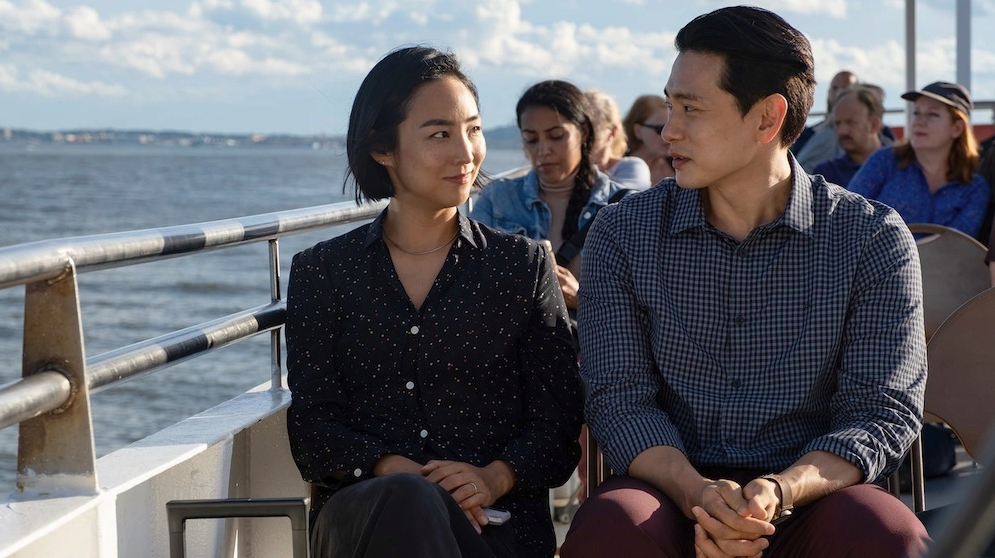
Na Young is the brightest student in her middle school class in Seoul. She is so driven to succeed that even the one time she loses to her rival Hae Sung, Na Young is so upset that she cries. Still, the two high-achievers bond, emotionally as well as academically. More than simple friendship, they understand their lives are bound into the future, presumably affectionally.
When Na Young’s parents immigrate to Canada, she becomes the semi-assimilated Nora Young (Greta Lee), ambitious playwright. She meets aspiring writer Arthur, a Westerner and Jew (John Magaro), at a workshop. They fall in love, publish, and settle in New York to pursue their respective careers.
Hae Sung (Teo Yoo) has contacted Nora only once, some 12 years after her immigration. They drift apart again. Another 12 years later, after his own relationship founders, Hae Sung again contacts Nora. Finally, summoning his courage, he travels to New York to see the woman with whom he still believes he shares a past life (a Korean belief called In-Yun) and hopefully, a future, as well.
In an awkward series of encounters, Hae Sung nervously probes Nora’s commitment to her relationship and thoughts about the future. Will she stay with her American husband Arthur? Or is there a possibility she might re-kindle her affectional pairing with the pre-destined Hae Sung?
Writer and first-time Director Celine Song’s Past Lives is a spare, but rich, heartfelt tale of relationship, growth, and change. Nora has courageously staked out a new life, not rejecting the precepts of her heritage, but building on to it a new structure. She has grown and developed, robustly combining cultures. Her ambition has provided the drive. Her husband has nourished the change.
Hae Sung has stayed in one place. He remained in Korea, became an engineer, and settled for a middling job which, he regrets, pays a disappointing salary. Well into his 30s, he still lives with his parents. His previous girlfriend has split from him. He has not achieved the measure of success and creativity Nora has pushed to. Hae Sung has been locked into the In-Yun past life, a life he seems to project out into a future with Nora.
Through simple, direct narrative, writer/director Song has deftly sketched a shaded palette of relationships, resting mainly on the characters’ demonstrable actions. We are spared excessive internal dialogue, ancillary character reflections, or breaking the Fourth Wall. Interactions are crisp and direct.
The principals show us exactly who they are. There is little reaching outside of themselves, no persuasion or even great change in positions from when we first meet them. Even Nora, who flexes the most character development, is the outgrowth of pre-teen Na Young. So, there will be no enormous changes at the last moment.
By giving her characters the freedom to show us on the surface who they are, we see and understand how the nature of their choices rubs against their personal and cultural outposts. Engineers and writers act accordingly. But while there may be no great surprises, it is in the execution of their personalities that we appreciate who they are and how the film succeeds.
We hope you appreciated this article. At People’s World, we believe news and information should be free and accessible to all, but we need your help. Our journalism is free of corporate influence and paywalls because we are totally reader-supported. Only you, our readers and supporters, make this possible. If you enjoy reading People’s World and the stories we bring you, please support our work by donating or becoming a monthly sustainer today. Thank you!












Comments